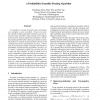Free Online Productivity Tools
i2Speak
i2Symbol
i2OCR
iTex2Img
iWeb2Print
iWeb2Shot
i2Type
iPdf2Split
iPdf2Merge
i2Bopomofo
i2Arabic
i2Style
i2Image
i2PDF
iLatex2Rtf
Sci2ools
ICDM
2006
IEEE
2006
IEEE
A Probabilistic Ensemble Pruning Algorithm
An ensemble is a group of learners that work together as a committee to solve a problem. However, the existing ensemble training algorithms sometimes generate unnecessary large ensembles, which consume extra computational resource and may degrade the performance. Ensemble pruning algorithm aims to nd a good subset of ensemble members to constitute a small ensemble, which saves the computational resource and performs as well as, or better than, the non-pruned ensemble. This paper will introduce a probabilistic ensemble pruning algorithm by choosing a set of sparse combination weights, most of which are zero, to prune the large ensemble. In order to obtain the set of sparse combination weights and satisfy the non-negative restriction of the combination weights, a left-truncated, nonnegative, Gaussian prior is adopted over every combination weight. Expectation-Maximization algorithm is employed to obtain maximum a posterior (MAP) estimation of weight vector. Four benchmark regression...
Combination Weight | Data Mining | Ensemble Pruning Algorithm | Ensemble Training Algorithms | ICDM 2006 |
Related Content
| Added | 11 Jun 2010 |
| Updated | 11 Jun 2010 |
| Type | Conference |
| Year | 2006 |
| Where | ICDM |
| Authors | Huanhuan Chen, Peter Tiño, Xin Yao |
Comments (0)

